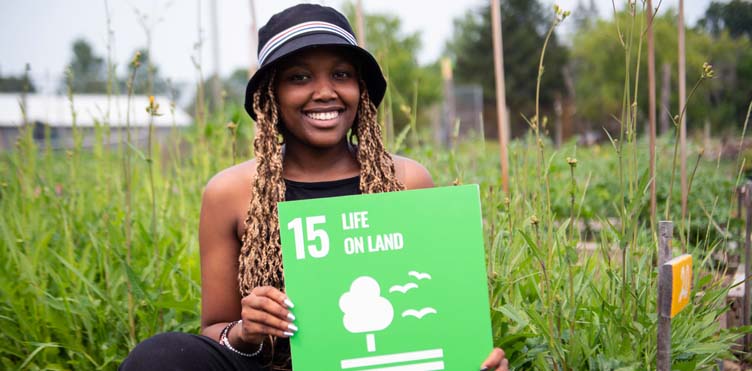EngagedUNB – Community engaged learning

You can make an impact by doing hands-on, meaningful work that helps solve real, immediate issues.
Community engaged learning (CEL) engages us in activities designed to promote learning and development, while addressing human and community needs. Our community partners are active co-creators of experiences and opportunities designed to help find innovative solutions to some of our most pressing challenges.
Founded on UN Sustainable Development Goals
EngagedUNB opportunities reflect UNB’s commitment to sustainable contributions to our communities through community-engaged learning. By using the United Nations Sustainable Development Goals (SDGs) as a framework for action, our learning community is working to create a more equitable, prosperous and sustainable future.
Sustainability+ Internship Program
The Sustainability+ Internship Program is partnering with non-for-profit organizations across New Brunswick, to provide UNB students with community-engaged learning (CEL) opportunities that reflect UNB's commitment to sustainability. Placements are typically 8-16 weeks long, running in the summer from May to August.
The Sustainability+ Internship Program is open to students from all faculties. We are dedicated to fostering a diverse and inclusive community, and we encourage applications from individuals of all backgrounds. Our goal is to provide equal opportunities for everyone, ensuring a welcoming and supportive environment.
The Office of Experiential Education at UNB offers wage subsidies for students in the Sustainability+ Internship Program through a variety of funding partners.
Opportunities
Course-based
Community engaged learning/Community service learning
Activities designed to promote learning and development, while addressing human and community needs. Engages a community organization as an external partner.
Field experience
Students work in an authentic setting to study and apply theoretical or academic knowledge and concepts.
Land-based education
Recognizes Wabanaki knowledge which fundamentally position land as a pedagogical framework. Land-based education opportunities engage participants in critical reflection on reciprocal relations and ethical practices while using Land as the site and object of learning.
Research-based
Community-based research
Research that actively involves those affected by the issue being studied, for the purpose of finding useful results to make positive change. This engages a community organization as an external partner.
Compass
Compass is a flagship community-engaged learning opportunity offered through UNB’s Office of Experiential Education. The Compass program at UNB supports economic, social, and civic development in rural communities throughout New Brunswick. Interdisciplinary teams of students work with rural communities and regions to create innovative solutions to pressing challenges in those regions.
Previous EngagedUNB opportunities
Natasha Taylor and Bee Me Kidz: Ending childhood poverty
Through Social Science in Practicum (SOCS 4501), Natasha Taylor worked as a social impact analyst at Bee Me Kidz, an educational non-profit which seeks to give elementary-aged children and their families the social and emotional skills they need to succeed.
The programs offered at Bee Me Kidz attempt to level the playing field when it comes to childhood poverty and the effects poverty can have on the chances of a child’s success in school.
Natasha created and administered a survey to measure the most impactful parts and possible areas of improvement in this programming, analyzed the data and created a report, which Bee Me Kidz can use going forward in their efforts toward ending the cycle of poverty.
Sarah Lunney and The Saint John Community Food Basket: Overcoming food insecurity
Third-year politics student Sarah Lunney was paired with The Saint John Community Food Basket by UNB Saint John’s Urban and Community Studies Institute for a summer internship.
The Food Basket is the city’s oldest foodbank, which distributes food to the city’s other three foodbanks and serves 1,000 people each month.
Sarah worked on advocating with local and federal politicians, helped the Food Basket work with other community agencies, found new ways to secure support from government and helped propose new projects addressing the issue of food insecurity.
Maeve McNutt and No One is Illegal Fredericton: Promoting peace and justice
Maeve McNutt completed an experiential education opportunity working with No One is Illegal Fredericton, LA Henry Law and the Fredericton Legal Advice Clinic on a Community ID project.
This project aims to provide community identification to marginalized or vulnerable individuals who may be without traditional forms of ID, including those with precarious immigration status, survivors of intimate partner violence and people experiencing homelessness, mental illness or other complicating factors. Without traditional government IDs, these individuals may not be able to access essential services available to other community members.
Maeve was able to complete vital work to move the project forward, including securing a partnership with the Fredericton Downtown Community Health Centre, obtaining approval from the Minister of Social Development to accept the IDs and research on other community ID programs.
